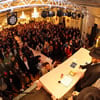Nestled in the mountains of Upstate New York, SUNY Oneonta is almost 100 miles from the state’s capital, Albany, and close to 200 miles from New York City. It is perhaps this isolation that makes it one of the top schools in the region. It’s also a place where students can be sure to experience college in what is described as “a small-town and homey feel.”
When Rabbi Meir and Fraidy Rubashkin arrived in 2012 to establish Chabad of Oneonta and the Rohr Jewish Student Center at SUNY, they found that “homey” feeling lacking for Jewish students. As such, establishing a warm, welcoming space for Jewish students was at the top of the agenda. The emissary couple hit the ground running and in the decade since their arrival, they have expanded their operations, with weekly Shabbat dinners, challah bakes and a variety of in-house Torah classes.
But being on a college campus, where students are at their most ready to receive knowledge, the rabbi has long harbored a dream of providing the students at the university more formal Jewish education as part of the school’s official curriculum. But each time the rabbi thought to advance the cause, there was another roadblock such as when the pandemic hit and the school started to limit its in-person lectures.
In the weeks following Oct. 7, an opportunity arose. Chabad hosted a vigil for the victims and hostages, an event that Rabbi Rubashkin calls “one of the most well-attended events we’ve ever put on.” Present at the vigil was the school president, who committed to SUNY Oneonta’s continued support of Jewish life on campus. The rabbi took her for her word and approached the administration about initiating a college-credited class on Judaism.
The president loved the idea, and they got to work creating a curriculum. After a providential meeting with a Jewish professor of psychology, who suggested establishing the course under his department, things really got moving.
‘A Knowledgeable Jew is an Empowered Jew’
It was all good and well that the Rubashkins had now found a host for the classes, but the question became what topics to choose to cover.
“We knew we had to take advantage of this opportunity,” Fraidy Rubashkin said. “We had to create a course that was new, exciting and interesting; but we also had to make sure we were using the opportunity to teach as much as possible.”
Alex Demieri, a senior at SUNY Oneonta, is excited for the upcoming course. Demieri herself has experienced antisemitism on campus and understands the importance of educating fellow students. This past year, a classmate called her an antisemitic slur in the classroom. Demieri stopped attending classes, shaken, and feeling unsafe. Faced with being unable to earn enough credits to graduate, and unsure how to proceed, the upcoming college-credited Judaism course will allow her to gain the credits she needs to graduate.
“There’s a lack of understanding about where antisemitism comes from,” she says, speaking about why it's “so important” for students to attend, regardless of their religion.
And Demieri is not alone. Jews on campus have told the Chabad emissaries that they don't feel educated enough about their own Judaism to respond to antisemitic protestors—a reality that has become all the more frequent since Oct. 7. The course, the couple hopes, will provide Jewish students with a sense of ownership of their Judaism and allow them to have confidence in themselves when facing the undeniable rise in antisemitism that has occurred on campuses across the country.
“The course will follow a variety of topics,” says Rabbi Rubashkin. “From the simple basics of Judaism, like the Jewish calendar and all its holidays, to the rituals associated with the holidays, as well as the daily rituals like prayer.”
Demieri will also be acting as a TA, a teacher’s assistant. She explains that that covers a variety of duties—from holding office hours to discussing the course with students to helping Rabbi Rubashkin with preparation and the curriculum.
“A knowledgeable Jew is an empowered Jew,” the rabbi said. “By teaching the students about who they are, about what it means to be a Jew, and most importantly how to act and practice as a Jew, we hope to create even stronger Jewish leaders on campus.”









Join the Discussion